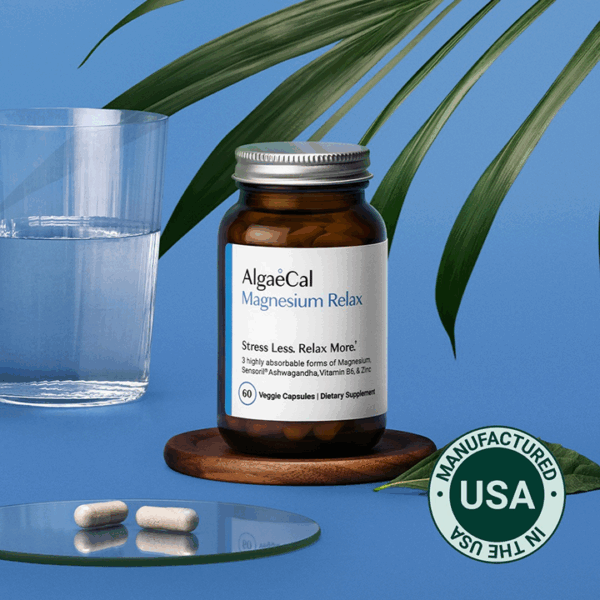As per Dr. Carolyn Dean, MD, ND, magnesium expert and Medical Director of the non-profit Nutritional Magnesium Association, the benefits that can be had from taking calcium (through diet or supplements) to improve and maintain good bone health can be impaired without a corresponding adequate intake of magnesium. In short, there is a fascinating link between magnesium deficiency and osteoporosis
As per her, a 1:1 ratio for calcium-magnesium is necessary to reap the benefits of calcium intake for bone health. It is believed that magnesium keeps the calcium dissolved in the blood which without the former (magnesium) would calcify leaving deposits in the kidney causing stones or even calcification of cardiovascular arteries and bone joints. (1)
Dr. Dean clearly outlined the magnesium-Vitamin D-calcium relationship that is so important for optimal absorption and metabolism of calcium. She was quoted as saying, “Magnesium is a vital nutrient that works synergistically with both calcium and vitamin D. Adequate levels of magnesium in the body are essential for the absorption and metabolism not only of vitamin D but of calcium, because magnesium converts vitamin D into its active form so that it can help calcium absorption. Magnesium also stimulates a particular hormone, calcitonin, which helps to preserve bone structure and draws calcium out of the blood and soft tissues back into the bones, impacting the possibility of osteoporosis, some forms of arthritis and kidney stones.” (2)
Common reasons cited for the lack of magnesium in our diets have been:
- Modern farming practices
- Food processing procedures
- Increased consumption of soda/ soft drink which leach vital minerals out of the body
In as recent as April 2011, a study was published in the journal Biological Trace Element Research, after studying 484 young healthy women with the objective of observing if improving dietary intake of magnesium may positively impact bone quality in this population. It spoke of the findings a positive relation between magnesium intake in healthy young adults and its relation to good bone quality. (3)
AlgaeCal Magnesium Relax™
Magnesium Relax provides a precise mix of these sleep-supporting nutrients to help settle the mind, reduce stress signals, and help you drift into deep, rejuvenating rest.
Here’s what goes into every bottle:
- Magnesium Glycinate, Citrate & Malate – a trio of easy-to-absorb magnesium forms that relax the body and mind so you fall asleep faster and stay asleep longer.
- Sensoril® Ashwagandha – supported by clinical research to cut cortisol by 24% and ease inflammation by 36%, clear signs your stress response is settling and true relaxation can begin.
- Zinc – supports melatonin production and helps you stay asleep through the night.
- P5P (active B6) – the bioavailable B6 that supports GABA production, helping quiet the mind and prepare the body for deep, restorative rest.
- AlgaeCal Absorb™ – our custom blend that helps your body soak up every drop of these calm-supporting nutrients.
Together, these ingredients help you relax more, stress less, and fall asleep naturally.
Get Magnesium Relax today for as little as $19 a bottle when you choose a 6-month bundle.
*These statements have not been evaluated by the Food and Drug Administration. This product is not intended to diagnose, treat, cure, or prevent any disease.
‡Results consistent with Clinical Trials. Results may vary.
†Open to US customers only.
Sources:
- Magnesium Deficiency Linked to Higher Risk of Osteoporosis, Says Doctor, PR Newswire, United Business Media.
http://www.prnewswire.com/news-releases/magnesium-deficiency-linked-to-higher-risk-of-osteoporosis-says-doctor-126240433.html - Mg Nutritional Magnesium Association. http://www.nutritionalmagnesium.org/
- Kim, M. H., Yeon, J. Y., Choi, M. K., and Bae, Y. J., Evaluation of magnesium intake and its relation with bone quality in healthy young Korean women, Biological Trace Element Research, April 5, 2011. http://www.ncbi.nlm.nih.gov/pubmed/21465282






Robert Thompson, M.D.
September 10, 2011 , 6:33 pmYes, Magnesium is very important. It is one of four major minerals the body needs for almost all its biochemistry. Everyone needs to know if they are deficient or not and what to take specifically to correct deficiencies or imbalances. I recommend hair tissue mineral analysis for everyone! This is the definitive test to determine levels of need and to correctly begin supplementation for correction of these needs and imbalances.